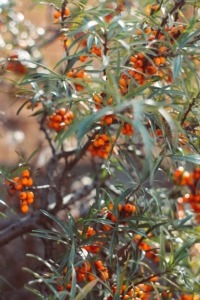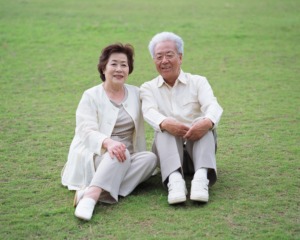Sea buckthorn has been known for its medicinal properties for hundreds of years. Today, it is gaining more attention due to its high nutritional value of bioactive compounds. The health benefits of sea buckthorn berries include anti-inflammatory effects, antimicrobial action, pain relief, boosting of tissue regeneration, and promotion of the immune system, as well as protection against cancer and cardiovascular disease. Sea buckthorn has been applied in many medical preparations for treating cancer, heart ailments, ulcers, hepatic disorders, burns, and brain disorders.
Major medicinal properties of sea buckthorn phytoconstituents are listed below:
*Tocopherols Minimize lipid oxidation; help to relieve pain.
*Carotenoids Help in collagen synthesis and epithelialization.
*Vitamin K Promotes wound healing; prevents bleeds, shows anti-ulcer effects.
*Vitamin C Sustains cell membrane integrity; accelerates collagen synthesis.
*Vitamin B complex Boosts cell repair and nerve regeneration.
*Phytosterols Show anti-ulcer and anti-atherogenic effects; regulate inflammatory processes.
*Polyphenolic compounds Show cytoprotective and cardioprotective effects.
*Poly unsaturated fatty acids (PUFA) Show immunomodulatory, neuroprotective and anti-tumor effects.
*Organic acids Decrease the risk of heart attack and stroke; show anti-ulcer and anti-arthritic effects.
*Coumarins and triterpenes Promote sleep, memory and learning.
*Zinc Strengthens the blood circulation; helps cell proliferation; shows anti-tumor effects; enhances utilization of vitamin A.
Cardiovascular Diseases
The most abundant flavonoids in sea buckthorn fruit and leaves are isorhamnetin and quercetin. Flavanols can lower the risk of cardiovascular diseases. Total sea buckthorn flavonoids show protective effects against myocardial ischemia and reperfusion, tumors, oxidative injury, and aging. Sea buckthorn Flavonoids protect endothelial cells from oxidized low-density lipoprotein induced injuries.
Diabetes
Many researchers have studied the potential of sea buckthorn to aid in the treatment of diabetes. Sea buckthorn extract significantly lowered the levels of serum glucose, triglyceride, and nitric oxide. Moreover, there were noticeable increases in serum superoxide dismutase activity and levels of glutathione. This demonstrates the potential hypoglycemic, hypotriglyceridemic, and antioxidant effects of sea buckthorn supplements, suggesting that sea buckthorn could be useful for preventing diabetic complications associated with hyperlipidemia and oxidative stress.
Sea buckthorn extract is able to inhibit α-glucosidase due to the antioxidant activity of six compounds in sea buckthorn: kaempferol-3-O-β-D-(6′-O-coumaryl) glycoside, 1-feruloyl-β-D-glucopyranoside, isorhamnetin-3-O-glucoside, quercetin-3-O-β-D-glucopyranoside, quercetin-3-O-β-D-glucopyranosyl-7-O-α-L-rhamnopyranoside and isorhamnetin-3-O-rutinoside. The butanol fraction showed the highest radical-scavenging activity and also the most powerful α-glucosidase inhibitory effect.
Antitumor Effect
According to scientific studies, three phenolic compounds (catechin, gallocatechin, and epigallocatechin) and a triterpenoid from sea buckthorn were shown to prevent TPA-induced inflammation.
The cytotoxic effects of sea buckthorn flavonoids have also been studied in human hepatocellular carcinoma cells it indicated that sea buckthorn extract exerted antitumor and growth inhibitory effects on the tumor cells.
Meanwhile Treatment with sea buckthorn leaf extract inhibited the proliferation, which are critical for the proliferation of tumor cells. Sea buckthorn treatment not only upregulated the expression of pro-apoptotic protein Bcl-2-associated X significantly, but also promoted its localization in the nucleus.
Sea buckthorn extract contains β-sitosterol, which have also been reported to exert antitumor activity.
Gastrointestinal Effect
Sea buckthorn has been studies for its ability to treat diseases of the gastrointestinal tract. Both the protective and curative effects of the sea buckthorn oils were studied. Sea buckthorn oil intake accelerated the healing process of acetic acid-induced gastric ulcers. In other research, ulcers induced in the same way were treated with procyanidins extracted from the sea buckthorn. Reductions in the sizes of the ulcers were noticed on days 7 and 14 in a dose-dependent manner. This suggests that the procyanidins in sea buckthorn play an important role in healing acetic acid-induced gastric lesions, possibly by accelerating mucosal repair. Sea buckthorn supplementation significantly reduced the size of the induced ulcers.
A key component of the gastrointestinal tract is its natural microflora. It was found that sea buckthorn seed oil supplementation could enhance the production of fecal short-chain fatty acids, especially acetic acid and butyric acid. Another mechanism resulting in lowering blood cholesterol by sea buckthorn seed oil is possibly mediated by stimulation of the growth of microbiota that produces short-chain fatty acids. The results showed an increase in the abundance of the short-chain fatty acids-generating Bacteroidales S24-7 group and decrease in Ruminococcaceae.
Wound Healing
Sea buckthorn has been used to aid skin regeneration, and has also found applications in modern medicine. Sea buckthorn fruit and seed oil contains high levels of unsaturated fatty acids (omega-3,6,7), natural antioxidants, vitamins (E, K), carotenoids, and phytosterols. All of these nutrients protect cell membranes and enhance cell regeneration. Palmitoleic acid is a component of skin used in burn treatment and wound healing. Sea buckthorn oil has been reported to have preventive and curative effects against different types of gastric ulcers, chronic cervicitis, and atopic dermatitis.
Sea buckthorn oil has been tested for its potential to ease the symptoms of menopause, such as vaginal atrophy and the thinning and drying of vaginal mucosa. It is suitable for women who cannot tolerate estrogen treatment. In one study, over 90 women were supplemented with sea buckthorn oil. After three months, the women showed improved vaginal health, including significantly better integrity of the vaginal epithelium.
Sea buckthorn oil has been investigated its possible effects on dry eye syndrome. A group of patients with dry eye syndrome were supplemented with sea buckthorn oil over a period of three months in autumn and winter. The sea buckthorn oil attenuated the increase in tear film osmolarity during the cold season and positively affected dry-eye symptoms.
Antimicrobial and Antiviral Properties
Sea buckthorn possesses antiviral and antimicrobial properties.Researchers used the hole-plate diffusion method to test the antibacterial potential of sea buckthorn berry extracts. The results showed that sea buckthorn extract produced a comparatively marked antibacterial response, whereas other extracts showed a weak zone of inhibition against all types of the tested bacteria.
Sea buckthorn also exhibits an antiviral response to Dengue virus infection. Sea buckthorn leaf extract was tested in Dengue virus type-2 infected blood-derived human macrophages and compared with the commercially available anti-viral drug Ribavirin. Sea buckthorn extract was equally effective at maintaining the cell viability of Dengue-infected cells as Ribavirin, which suggested that sea buckthorn leaf extract has significant anti-dengue activity.

Leave A Comment